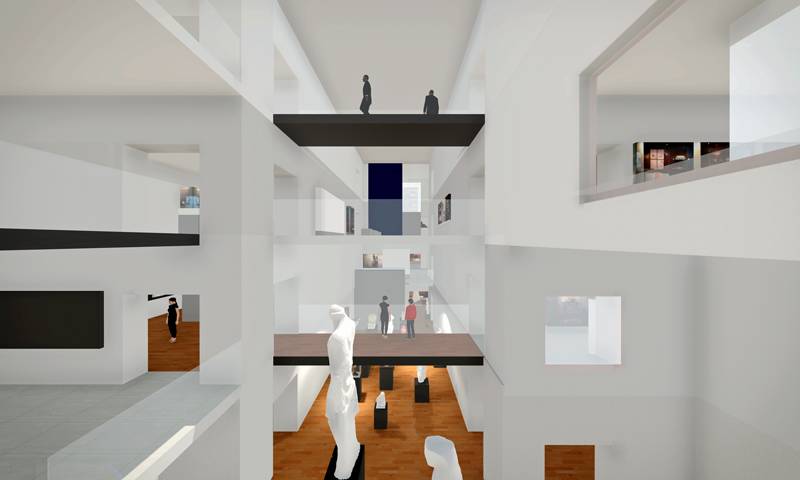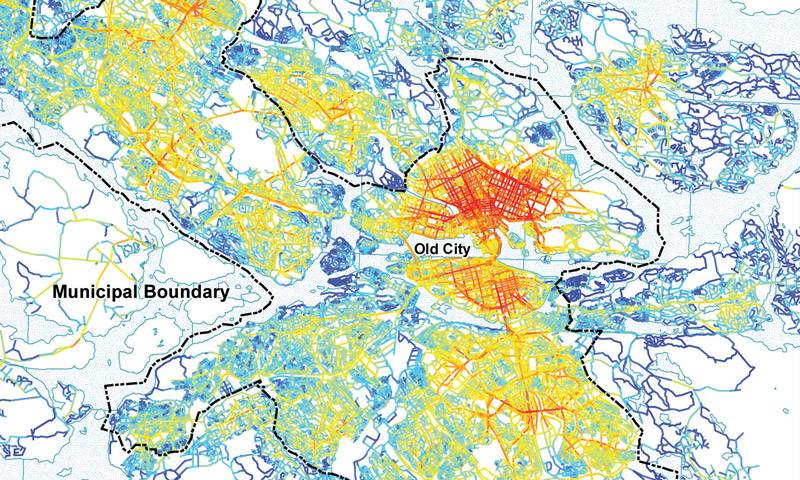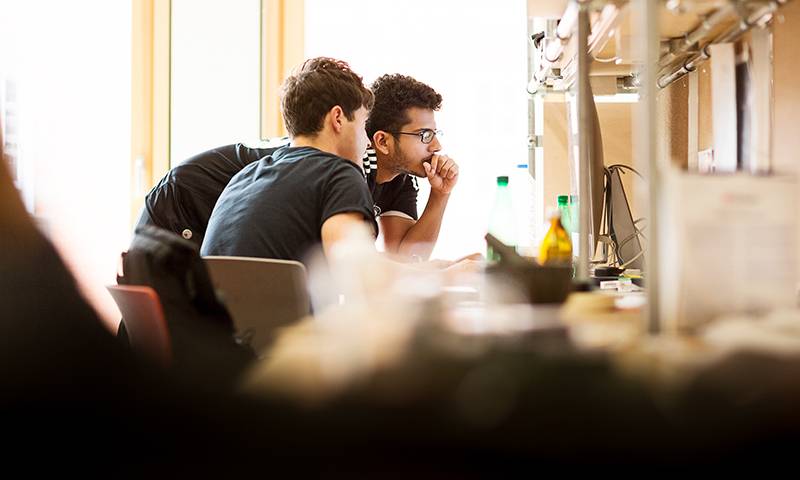 Overview
Overview

Architectural Space & Computation MPhil/PhD is associated with the world-renowned Space Syntax Laboratory. With its empirical base, this programme is aimed at researchers seeking to advance knowledge by studying the relations between spatial patterns and social outcomes, and between architectural design knowledge and computation.
There are two principal streams that lead to a PhD in Architecture:
- Space and Society in Buildings and Cities, in which students use space syntax theories and methods to study the effects of spatial design on aspects of the social, organisational and economic performance of buildings and urban areas.
- Architectural Computation, in which students apply technology to research into the built environment, bringing innovative computational analytical methods - including analytial and machine learning methods, and virtual and augmented reality - to the heart of the design process.
View the UCL prospectus for this MPhil/PhD
Structure
Students pursue independent research projects supervised by a principal and secondary supervisor, culminating in a doctoral thesis of up to 100,000 words. Student topics are aligned to staff members' research interests, which range from media architecture, design interaction and architectural computation to workplace design, spatial narratives and urban design.
Research supervision is complemented by a programme of fortnightly seminars throughout the academic year – some led by students, others by experts from UCL and around the world. In the past year, these have included Professor Howard Davis from University of Oregon; Dr Vintio Netto, Fluminense Federal University, Brazil; and Justin De Syllas of Avanti Architects.
In their first year, students on the Space and Society in Buildings path will often audit selected modules from Space Syntax: Architecture & Cities MSc/MRes; students on the Architectural Computation path will audit selected modules from Architectural Computation MSc/MRes. This means they benefit from the rigorous training in theories and methods that these programmes provide.
Architectural Space & Computation MPhil/PhD is also associated with the InnoChain European research network and the Engineering Doctorate in Virtual Environments, Imaging & Visualisation. Students on these programmes will typically take some of their taught modules jointly with students at The Bartlett.
Supervisors
As an MPhil/PhD candidate, you will have two doctoral supervisors: one from the school, while the other could be from another school at The Bartlett or elsewhere in UCL, depending on your research area.
To discuss a possible MPhil/PhD within the Space Syntax Laboratory, it is recommended that you have a look at the profiles of the supervisor with whom you would like to work and email them a preliminary paragraph or two about your research interests.
- Current supervisors
Space and Society in Buildings and Cities
Dr Sam Griffiths
Theories and methods for researching and writing the historical relationship between urban populations and their built environments; the spatial cultures of industrial cities, suburbs and high streets; urban manufacturing; architecture as chronotope in realist fiction and historical writing; space syntax as an interdisciplinary approach to research in the humanities and social sciences.Professor Kayvan Karimi
Evidence-informed, analytical, urban and architectural design; Organic cities and naturally-evolved urban systems; Informal settlements and slum regeneration; New Towns; Strategic planning and large-scale developments; Public realm and street design; spatial networks and transport systems; spatial networks and urban economics.Professor Sophia Psarra
Architecture narrative and fiction, geometry of architecture and urban space; conceptual order, spatial morphology and spatial experience; the formation of spatial meaning in architecture and symbolic languages across different media; architectural theory; the morphology of cities in relation to processes of industrialisation, de-industrialisation and innovation; spatial design of complex buildings and its relation to society and organisations; computer modelling and visualisation.Professor Kerstin Sailer
Relationship between spatial configuration, organisational structure and social dynamics within complex buildings (offices, schools, laboratories, universities, hospitals, multifunctional buildings); Space usage patterns; Organisational theory, Organisational behaviours, Space Syntax, Social Network Analysis, Evidence-Based Design.
Professor Laura Vaughan
The relationship between urban form and society with regard to communities, social and economic spatial patterns; suburbs and suburban town centres; ethnic and immigrant quarters; neighbourhoods and town centres; poverty and prosperity; wellbeing and health. Urban historical research, focusing on the nineteenth century city; urban mapping.Architectural Computation, Machine Intelligence and Virtual Reality - Extended Reality in Architecture
Ava Fatah gen Schieck
Architecture and interaction design; media architecture; media city; digital urban interaction; extended reality (mixed reality, augmented reality and virtual reality); sensory environments (with the focus on museums); human-centred smart city; embodied and embedded interactions; urban media art; design, content creation, placement and evaluation of public displays and networked urban screens; co-creation of media content with communities.
Professor Sean Hanna
Spatial cognition; mathematical and computational modelling of spatial and social relationships; individual and collective creativity; machine learning and intelligence; complexity and big data.Professor Alan Penn
Urban research at the scale between the building and the city; design of complex buildings and their relations to organisations (i.e. hospitals, laboratories and offices); development of computing for architecture; urban pollution dispersal; virtual reality applications for the built environment; simulation of social phenomena and urban growth and change.Dr Tasos Varoudis
Hybrid architecture, computational analysis and machine intelligence; spatial and architectural computation; development of new methodological and computational innovations combining spatial data-driven models with machine learning and agent-based models.Professor Peter Bishop
How cities evolve, the forces that shape them outside the conscious design process and the mechanisms by which urban change takes place.
Funding opportunities
One three-year studentship for a UK candidate with strong spatial data analytical skills beginning in September 2023. The candidate will need to apply to the Architectural Space & Computation MPhil/PhD programme at The Bartlett School of Architecture, University College London, where they will be supported in developing a broad characterisation of Bradford’s spatial geography, in order to analyse the relationship between mental health and factors such as access to green space, proximity to local high streets, or social connectivity. Access to data on the health of children in Bradford will be provided by the Born in Bradford project. The research will contribute to the development of built environment indicators for the Connected Bradford project, which links up routine health, social and educational data on over 530,000 Bradford residents.
More details are available by downloading this pdf or by emailing Professor Laura Vaughan.
Visit our funding page to find out more about funding your studies.
Careers
The Bartlett School of Architecture is one of the world's top-ranked architecture schools and our students enjoy excellent employment opportunities. Upon completion of their PhDs, students have gone on to pursue careers in a wide variety of fields, including academic roles.
Contact
Programme Director and Departmental Tutor: Ava Fatah gen Schieck
Programme Administrator: Emmy Thittanond
Image: Athina Lazaridou, 'Spatial navigation in real and virtual museums in two and three dimensions: VR navigational model of the Ashmolean Museum in Oxford, UK.'
 Close
Close



